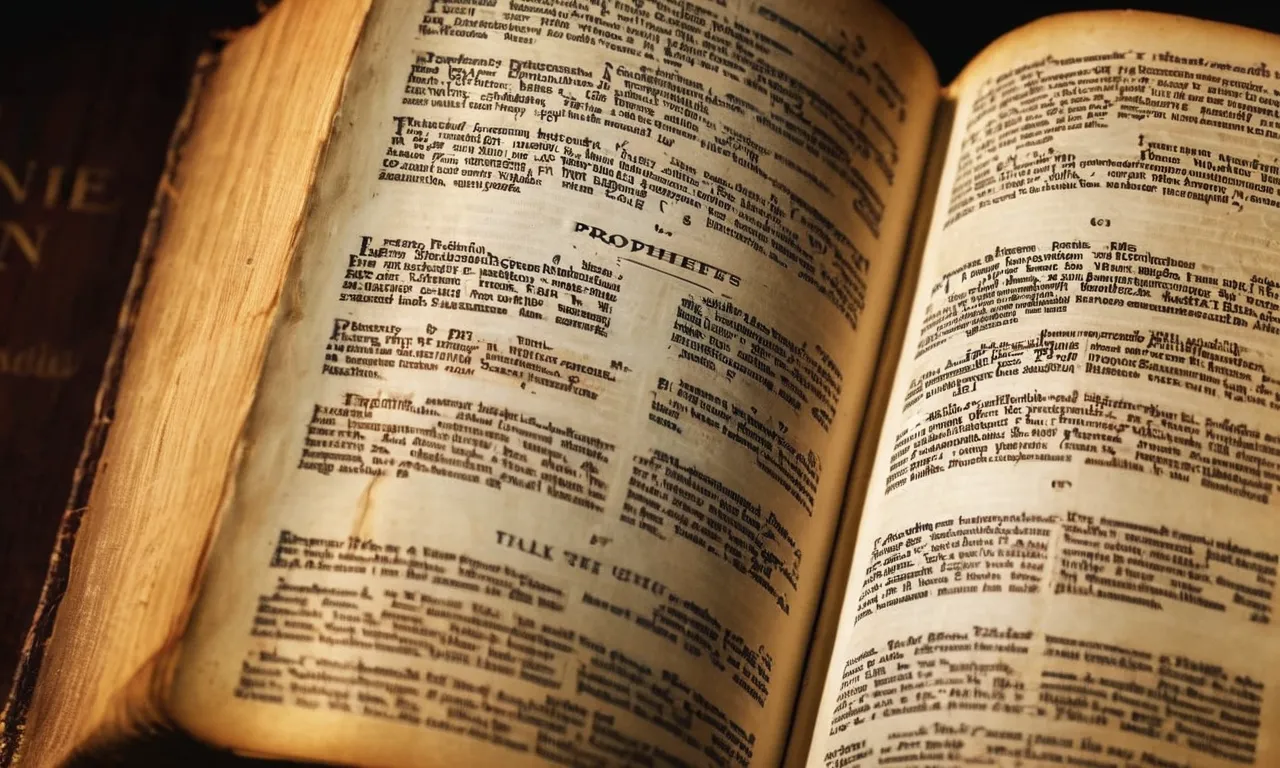How Many Prophets Are In The Bible?
The Bible contains messages from many prophets that God chose to speak through over the centuries. If you’re wondering how many prophets there are total, here’s a quick answer: there are 16 prophets in the Bible who have books named after them, but over double that number are mentioned by name.
In this comprehensive article, we will explore the different classifications of prophets found in Scripture and provide an estimated count for each category.
We will cover the major and minor prophetic books, the difference between non-writing prophets, writing prophets, and false prophets, the prophets of the Old and New Testaments, and more. By the end, you will have a thorough understanding of the diversity of prophetic voices that contribute to the Bible’s divine message.
Types of Prophets in the Bible
Major and Minor Prophetic Books
The Bible contains 17 books that are considered prophetic – these are divided into the Major Prophets and Minor Prophets. The Major Prophets refer to Isaiah, Jeremiah, Lamentations, Ezekiel , and Daniel in the Old Testament.
These books are longer in length than the 12 Minor Prophetic books, which include Hosea, Joel, Amos, Obadiah, Jonah, Micah, Nahum, Habakkuk, Zephaniah, Haggai, Zechariah, and Malachi.
Non-Writing vs. Writing Prophets
There is also a distinction made between the non-writing prophets and writing prophets. The non-writing prophets refer to those who spoke the word of God but did not have their prophecies recorded in scripture. Some examples would include Nathan, Elijah, and Elisha in the Old Testament.
The writing prophets are those whose prophecies and messages were written down, either by themselves such as in the case of Jeremiah and Daniel, or by others like how Joshua and Samuel’s assistants recorded their words.
True Prophets vs False Prophets
Furthermore, the Bible makes a contrast between true prophets and false prophets. True prophets were appointed by God and spoke His word faithfully, even in the face of opposition. Their prophecies also came to pass, validating their authenticity.
In contrast, false prophets purported to speak for God but taught false doctrines. They prophesied events that did not come to pass or tickled people’s ears with what they wanted to hear. The Bible warns believers to “test the spirits” and discern true prophets from false ones (1 John 4:1).
| True Prophets | False Prophets |
|---|---|
| – Appointed by God | – Self-appointed |
| – Spoke God’s word faithfully | – Twisted God’s word or taught lies |
| – Faced opposition and persecution | – Tickled people’s ears |
| – Prophecies came true | – Prophecies failed |
Old Testament Prophets
Moses as a Prophet
Moses is considered one of the greatest prophets in the Old Testament. As the leader who freed the Israelites from slavery in Egypt, Moses fulfilled God’s command to confront Pharaoh and demand the release of the Hebrew people.
In addition to leading the Exodus, Moses received the Ten Commandments from God on Mount Sinai. These sacred laws formed the foundation for the ancient Israelite religion.
As a prophet, Moses acted as a messenger between God and the Israelites. He communicated God’s will, law and instructions to the people. His role highlights a key function of a biblical prophet – to be a spokesperson for the word of God.
Prophets With Books Named After Them
Several prophets in the Old Testament have books named after them, indicating their importance and high-profile status:
- Isaiah: The book bearing his name contains prophecies ranging from the 8th to 6th centuries BC.
- Jeremiah: This prophet warned of Jerusalem’s coming destruction for failure to follow God’s laws.
- Ezekiel: Living in Babylon after the siege of Jerusalem, Ezekiel supported the exile community with visions from God.
- Daniel: Taken to Babylon after the destruction of Jerusalem, Daniel gained fame interpreting dreams and advising rulers.
- Hosea: This prophet framed his message around his relationship with his unfaithful wife.
- Joel: His short book describes locust plagues and calls Judah to repentance.
These prophets contributed key texts to the Old Testament that record divine predictions, warnings, and encouragement.
Prophets Mentioned in the Old Testament
In addition to famous prophets with biblical books, many other prophets are mentioned in the Old Testament historical records:
| Prophet | Period of Activity | Summary |
| Elijah | 9th century BC | Contested prophets of false god Baal in epic Mount Carmel contest. |
| Elisha | 9th-8th century BC | Performed miracles and gave advice to Israel’s kings. |
| Nathan | 10th century BC | Rebuked King David for adultery and murder. |
| Deborah | 12th century BC | Female judge and prophet who led Israelites to victory. |
These lesser-known prophets played vital religious roles in ancient Israelite society as spokespeople revealing God’s truth to the leaders and people of their time. Their messages called the nation to follow divine laws and fulfill their covenant obligations to God.
To learn more, check out this overview on the Minor Prophets of the Old Testament.
New Testament Prophets
Jesus Christ
Jesus Christ is considered by Christians to be the ultimate fulfillment of Old Testament prophecies about the coming Messiah. Although Jesus did not use the title “prophet” for himself, he is described in the Gospels as a prophet and operated in a prophetic role.
Here are some key aspects of Jesus’ ministry as a prophet:
- Jesus spoke authoritatively about God’s will, character, and kingdom.
- He foretold future events related to himself, his followers, Jerusalem, and the end times.
- He called people to repentance and proclaimed the good news of salvation.
- He performed miracles, signs, and wonders that validated his divine authority.
- He claimed continuity with the prophets of old and authority above all other prophets.
Some specific prophetic statements made by Jesus include his predictions about his death and resurrection, the coming destruction of the temple in Jerusalem, his second coming, and the final judgment.
Christians believe the life, ministry, death, and resurrection of Christ were part of God’s prophetic plan to provide redemption through him. Jesus is considered the greatest of all prophets and his life and teachings are recorded in the four Gospels.
John the Baptist
John the Baptist was a Jewish prophet who played a key role in preparing the way for Jesus. He served as a transitional figure between the Old and New Testaments. Here are some ways John fulfilled a prophetic role:
- He called the Jewish people to repentance in light of the coming Messiah.
- He announced the imminent arrival of God’s kingdom and coming judgment.
- He baptized people as an outward sign of repentance and cleansing from sin.
- He proclaimed Jesus as the “Lamb of God” who would take away the sin of the world.
- He courageously confronted hypocrisy and sin and called leaders to righteousness.
- He fulfilled Old Testament prophecies about a messenger who would prepare the way for the Messiah.
John’s prophetic ministry is outlined in all four Gospels and recounted briefly in Acts. He prepared the people for Jesus’ ministry, identified and announced Jesus as the Messiah, and called people to repentance in light of the nearness of God’s kingdom.
John is considered the last great prophet of the Old Testament dispensation and the bridge between the Old Testament prophets and the Messiah he heralded.
New Testament Writers as Prophets
In addition to Jesus and John the Baptist, several New Testament figures exercised prophetic ministries or were recognized as prophets. Here are some examples:
- The prophetess Anna recognized Jesus as the redeemer at his dedication (Luke 2:36-38).
- The disciples of John the Baptist, like Apollos, taught accurately about Jesus (Acts 18:24-28).
- Agabus foretold a famine (Acts 11:27-28) and later predicted Paul’s suffering (Acts 21:10-11).
- Judas and Silas exhorted and strengthened the early church with prophetic messages (Acts 15:22-33).
- The four daughters of Philip prophesied and evangelized (Acts 21:8-9).
- Leaders like Barnabas, Simeon, and Manaen were called prophets (Acts 13:1).
- Paul considered his letters prophetic writings (Rom. 16:25-27).
- The book of Revelation contains prophecies from Jesus to John for the churches.
While Jesus was unique as the promised Messianic prophet, the early church recognized, valued, and benefited from prophetic ministries in its midst. The New Testament is the product of prophetic apostles, and prophecy is included in the Ephesians 4 list of leadership gifts Jesus gave to equip the church.
The Purpose of Prophets
Speak God’s Messages
The primary role of prophets in the Bible was to speak God’s messages to His people. They acted as messengers through whom God revealed His will, gave warnings, and provided guidance. Biblical prophets like Isaiah, Jeremiah, Ezekiel and others relayed revelations they received from God, often calling God’s people to repentance and renewed faithfulness.
For example, the prophet Amos gave stern warnings of coming judgment if the people did not turn from idolatry and oppression of the poor (Amos 5). Prophets were mouths through which God spoke directly and authoritatively to His people.
Warn of Coming Judgment
Many prophets like Jeremiah and Ezekiel were called to deliver a sobering message – that God’s judgment was imminent if the people did not repent. Ezekiel warned that destruction was coming on Jerusalem because of the people’s detestable sins (Ezekiel 22).
Prophets often warned that corrupt leaders and false prophets would lead people astray. For instance, Jeremiah confronted false prophets who proclaimed peace when there was no peace, misleading the people (Jeremiah 6:13-14).
The warnings of coming catastrophe if people persisted in sin underlined the gravity of ignoring God’s word.
Call to Repentance and Hope
Despite prophets’ warnings of coming judgment, their message also contained a call to repentance and hope. Isaiah urged the people to wash, cleanse themselves and remove their evil deeds so they could be restored (Isaiah 1:16-20).
After condemning Israel’s sins, Ezekiel gave a hopeful vision of spiritual restoration (Ezekiel 36:24-28). Prophets assured that if God’s people turned from their wicked ways, He would forgive, heal and restore them.
Even the most dire prophecies contained light amidst the darkness – that by turning back to God, the people could experience renewal. This message of hope was ultimately fulfilled in Jesus Christ.
Conclusion
In conclusion, while there are 16 books by Old Testament prophets, over 55 prophets are mentioned by name in the Bible once various classifications are accounted for. From Moses to John the Baptist, these holy men spoke boldly for God, preparing the way for the coming of the Messiah Jesus Christ.
By understanding the diversity and purpose of prophets in Scripture, we can better appreciate their integral role in relaying the entirety of God’s Word throughout biblical history.








